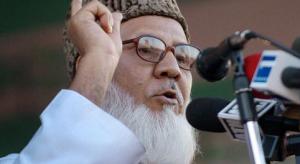BangladeshLeader of Bangladesh’s largest Islamist party hanged for 1971 war crimes
Motiur Rahman Nizami, the leader of Bangladesh’s largest Islamist party Jamaat-e-Islami, was hanged at a prison in the capital, Dhaka, on Tuesday. Last week the nation’s highest court dismissed his final appeal of the death sentence, imposed on him for atrocities committed by him and his followers during the 1971 war between the majority if the Bangladeshi population, which favored independence from Pakistan, and the Pakistani military. The Islamist Jamaat movement supported the continuation of Pakistani rule over Bangladesh, and fought along the Pakistani military in an effort to suppress the pro-independence rebellion.

Motiur Rahman Nizami prior to arrest // Source: commons.wikimedia.com
Motiur Rahman Nizami, the leader of Bangladesh’s largest Islamist party Jamaat-e-Islami, was hanged at a prison in the capital, Dhaka, on Tuesday. Last week the nation’s highest court dismissed his final appeal of the death sentence, imposed on him for atrocities committed by him and his followers during the 1971 war between the majority if the Bangladeshi population, which favored independence from Pakistan, and the Pakistani military.
The Islamist Jamaat movement supported the continuation of Pakistani rule over Bangladesh, and fought along the Pakistani military in an effort to suppress the pro-independence rebellion.
The country’s law and justice minister, Anisul Huq, said the 73-year-old Nizami was hanged after he refused to seek mercy from the country’s president. “He was executed between 11.50pm and midnight,” Huq said.
Aljazeera reports that Nizami’s hanging will exacerbate already-high tensions in the Muslim-majority nation. The last three years saw a wave of violence by Islamist activists, who killed several secular and liberal bloggers and journalists.
In 2013, a dozen Jamaat officials were convicted for war crimes during the 1971, and the conviction led to a wave of violence in which more than 500 people were killed.
Nizami is the fifth, and highest-ranked, Jamaat leader to be executed since December 2013. Seven more leaders of the movement n are on death row.
“We’ve been waiting for this day,” said the home affairs minister, Asaduzzaman Khan, adding that people “will remember this day for ever”.
Jamaat has insisted that the charges against Nizami were false, and that the trials, convictions, and executions of the party’s leadership were politically motivated.
Nizami became Jamaat leader in 2000, leading it, and an alliance of smaller Islamist parties, to victory in the 2001 general election. He served in the government between 2001 and 2006.
The prosecution argued Nizami was in charge of setting up the pro-Pakistani al-Badr militia, which killed top Bangladeshi writers, doctors, and journalists toward the end of the war with Pakistan. The bodies of dozens of Bangladeshi professionals were found blindfolded with their hands tied and dumped in a marsh at the outskirts of the capital.
The goal of the al-Badr militia was to weaken the emerging state of Bangladesh by killing as many professionals as they could get their hands on before Pakistan withdrew.
Witnesses at the trial said Nizami ordered the killings in order to “intellectually cripple” Bangladesh.
In 2010, prime minister Sheikh Hasina’s government established a tribunal which sentenced more than a dozen opposition leaders for war crimes. Nizami was convicted in October 2014.
Legal scholars and rights groups say the procedures of the tribunal do not meet global standards and lack international oversight.
Between 250,000 and 300,000 people were killed in the 1971 war.
